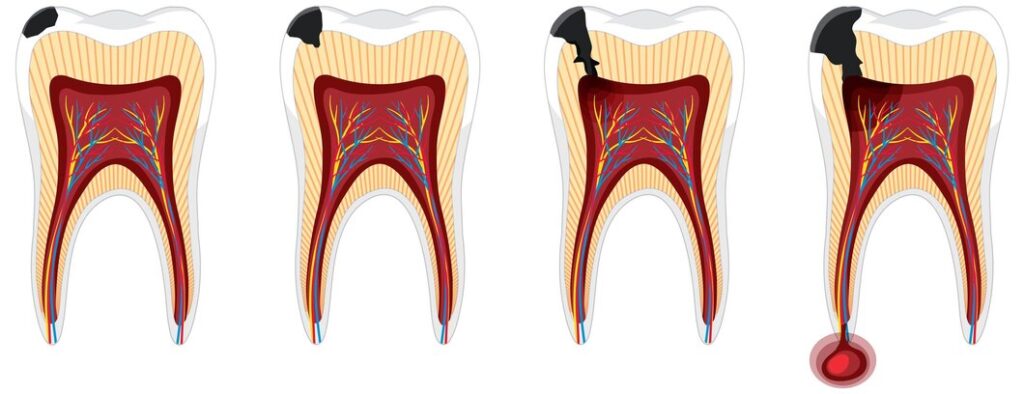Dental cavities, also known as caries are among the most common health issues in the world today. They refer to areas in the hard surface of your tooth that are damaged, forming small openings or areas of tooth decay that can result in severe toothache, infection and even tooth loss. They tend to occur mostly in children, adolescents and the elderly. However, anyone can practically develop cavities, as long as the person has teeth.
How are cavities formed?
Cavities occur as a result of an interplay of several factors. Usually, your mouth harbours certain bacteria which feed on remnants of sugary foods in the mouth, converting these sugars into acids. When these acids mix with saliva and other food particles, they form a sticky substance that attaches to the surface of your teeth, known as plaques. Over time, due to inadequate brushing and flossing, the acids in plaques dissolve the hard layer of the teeth, known as enamel, forming cavities or holes in it.

In view of this, factors such as poor oral hygiene and excessive consumption of sugary foods significantly predispose one to developing dental caries. Other risk factors may include not drinking enough water, excessive alcohol and caffeine consumption, use of certain medications such as antidepressants as well as some medical conditions like heartburn.
What are the symptoms?
Small cavities may not show any symptom. But as they become larger, they may cause one or more of the following:
- Toothache, which can be excruciating
- Tooth sensitivity
- Pain when eating or drinking something sweet, hot or cold
- Visible holes or openings in the teeth
- White, brown or black staining on the surface of the tooth
- Tooth loss
How are cavities treated?
Cavities are easily treated by your dentist, who would often employ one of the following modalities to manage the condition:
- Fillings: this involves your dentist drilling into the affected tooth, removing the decayed parts and filling the now-empty space.
- Crowns: this is used when most parts of the tooth have decayed. It involves fitting a crown to cover the remaining part of the tooth thus preventing it from further deterioration.
- Root Canal Therapy: this is employed when the decay affects the nerves of the tooth. It involves the dentist removing the damaged nerves to relieve pain and prevent further complications. It may also involve applying dental fillings to the now-empty canals and pulp chamber.
- Tooth extraction: this is done when other treatment options may not be effective. Your dentist will simply pull off the entire tooth under appropriate anaesthesia and may replace the extracted tooth with dentures, bridges or implants.

How can you prevent cavities?
Good oral hygiene is a simple and effective way to prevent cavities.
- Brush twice daily with fluoride-containing toothpaste
- Floss at least once a day to remove plaque buildup between your teeth
- Drink enough water
- Avoid excessive consumption of snacks and sugary foods
- Above all, visit a dentist at least twice in a year for professional dental cleaning and checkups.
A Word From HealthFacts to You
Always remember that your oral health is as important as your overall health and while effective treatments for cavities exist, an intact tooth is always better! So, avoid cavities by embracing good oral hygiene practices and making it a habit to see a dentist at least once in six months.









